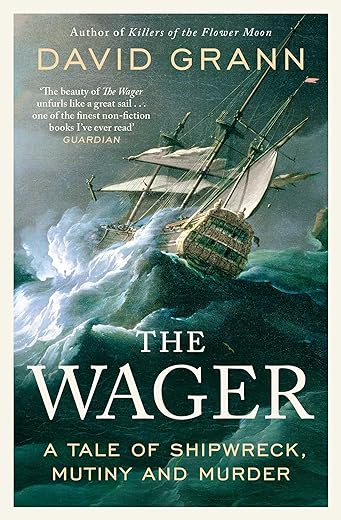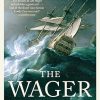The Wager
£9.60£10.40 (-8%)
‘The greatest sea story ever told’ Spectator
‘A cracking yarn… Grann’s taste for desperate predicaments finds its fullest expression here’ Observer
THE INSTANT NEW YORK TIMES NO. 1 BESTSELLER
From the international bestselling author of KILLERS OF THE FLOWER MOON and THE LOST CITY OF Z, a mesmerising story of shipwreck, mutiny and murder, culminating in a court martial that reveals a shocking truth.
On 28th January 1742, a ramshackle vessel of patched-together wood and cloth washed up on the coast of Brazil. Inside were thirty emaciated men, barely alive, and they had an extraordinary tale to tell. They were survivors of His Majesty’s ship the Wager, a British vessel that had left England in 1740 on a secret mission during an imperial war with Spain. While chasing a Spanish treasure-filled galleon, the Wager was wrecked on a desolate island off the coast of Patagonia. The crew, marooned for months and facing starvation, built the flimsy craft and sailed for more than a hundred days, traversing 2,500 miles of storm-wracked seas. They were greeted as heroes.
Then, six months later, another, even more decrepit, craft landed on the coast of Chile. This boat contained just three castaways and they had a very different story to tell. The thirty sailors who landed in Brazil were not heroes – they were mutineers. The first group responded with counter-charges of their own, of a tyrannical and murderous captain and his henchmen. While stranded on the island the crew had fallen into anarchy, with warring factions fighting for dominion over the barren wilderness. As accusations of treachery and murder flew, the Admiralty convened a court martial to determine who was telling the truth. The stakes were life-and-death—for whomever the court found guilty could hang.
Read more










by Mat m.
Had a ball reading this , I couldn’t put it down .
Would have been better if the author didn’t try to judge men from 250 years ago with his modern New York morals .
And Jon krakauer I’m not sure we read the same book
by Amazon Customer
Brilliant, and well researched.this is the third book of his that I have read.
by m.bowthorpe
A brilliant book, very happy, thank yyou so much,
by English Literature Student
The reviews in the press for this book were excellent. However, I thought it was good, but no better than this. The story starts impressively, but becomes less engaging as it develops. The author also cannot resist making self-righteous judgments reflecting his 21st century values at various points. I found this irritating.
A far, far better read, set at around the same time and in the same part of the world, is available. Read David Thomson’s account of Darwin’s and Fitzroy’s expedition in “This Thing of Darkness”. This book will astound you and reveals the shortcomings of “The Wager”.
by Sandy Hobbs
a most captivating book that keeps you fully involved throughout
by Francisco Amaral
The book is very interesting specially because the reader is satisfied that the written facts are the most according to the truth as possible.
by gerardpeter
The author draws on detailed diaries to provide an engrossing account of the last voyage of The Wager, part of a small British squadron chasing Spanish galleons round the world’s oceans in the middle of the 18th century. For those who follow survivor challenges on reality television take a deep breath. This is very much the real thing. But there is more to this tale than that.
Certainly, the resourcefulness of the castaways is extraordinary and meriting the word heroic. However, The vast majority of the crew never returned, Significantly most died before the ship foundered and indeed many were none too fit when they embarked in the first place. Scurvy was the big killer, then typhus. Later some simply starved and more than one was murdered.
Many of the survivors wrote accounts of their trials, some were published, but only one stood the test of time. This was the story of the Commodore or Squadron Leader, Anson, who had a narrative of glory written about him, eulogising himself and the purported virtues that were displayed by the Royal navy and the men of the British Empire. In truth, it was a sordid affair from beginning to end propelled by the Imperialist ambitions of England, the megalomania of its senior officers and the service, often pressed, of ordinary men, some of whom admittedly felt a warmth for the cause.
David Grann compares the challenges faced on board with the hazards on land. The skills required to build a team to survive in the wilderness were different from those employed by the captain at sea. It is an interesting study in leadership and its failures.
It is hard to imagine just how frightening the journey round Cape Horn must have been. Youtube videos of storms will add something to the author’s colourful prose. For those interested, I would recommend Caliban Shore by Stephen Taylor, the account of a similar disaster a little later on the coast of Africa. Both ask the question – what exactly was this Imperial civilisation?.
by James-philip Harries
This is a book that should be read on a dark and stormy night beside a comfortable fire. I read it in a balmy springtime but it is none the worse for that.
To set the scene. In the War of Jenkin’s Ear, Commodore Anson was sent with a small fleet to try and capture a Spanish galleon. Rounding Cape Horn the crews were already suffering from scurvy (vitamin C deficiency, a feature of long voyages). The Wager, one of the least of the fleet, was wrecked on the east coast of Chile.
Tales of suffering and survival from the period are many, but what sets this story apart is the copious documents in the archives at Kew, and the insight it brings to human responses to adversity, fluctuating currents of leadership, decision making and the astonishing survival of several disparate parties.
On two occasions the castaways were helped by the local “savages” and I would have liked to learn more about this tribe, now mostly lost to history. Also the dynamic of the rebel group is an intriguing sub plot. But that is to quibble.
What did the Admiralty do about this tale of shipwreck, mutiny and survival when the principals at last returned? Read to the end to find out.